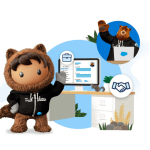With the focus on Mental Health Awareness Week, May provides us with a great opportunity to reflect on our own mental health and that of those around us. This year’s theme was Anxiety and unfortunately, work can be a source of anxiety for many, especially when it comes to balancing work and life together.
So, what can you do as a manager to create a work-life harmony for you and your teams? How do you integrate this into everyday team life?
Well, that is a topic that’s the heart of my role as a Marketing Director and Coach at Salesforce. I’m very lucky that I get to integrate the learnings from my coaching life into my leadership style.
Here are my observations to create safe and high-performing environments:
Creating a sense of belonging for you and your team
Think of all the great teams you have ever been part of. What were the special ingredients that gave you that sense of belonging and safety? Was it the permission to be yourself? A true sense of trust, loyalty and knowing each of your team has your back? This makes me think of Ted Lasso and his ‘Believe’ poster – everyone coming together towards one goal. If you have not yet seen Ted Lasso that is a must for any leader or believer in the power of teams.
Giving space for your teams during the week so they have time to reflect and share how they are
We all know when we get a chance to reflect rather than ruminate we learn faster and get to move forward with ease. So how do you do that? Cancelling set meetings and taking the same meeting via a tool like Slack. Then in our team’s own time, they can provide updates and ask the same way they would do in an in-person or virtual meeting. You can also make sure you:
- Honour weekly 1:1s with each of your direct reports. Making these coaching conversations to build awareness and control over their own outcomes. Learn the fundamentals of coaching to become a coach vs a mentor.
- Start each meeting with a mindfulness exercise such as a breathing exercise or following an online meditation. This can take anything from 3 to 10 minutes but can change the course of the day for you and your team. It’s not always about the big moments of space but micro-moments.
- Show that you also step away during the day. This means they also have permission to have that harmony through their work and life to get things done.
Arrange monthly or quarterly check-ins. Provide team development time with a Coach and Facilitator. Make sure you’re ending and starting each quarter with built-in reflection as a team together. Constructive feedback along with positive reinforcement of what is going well is key.
Fearless Teaming
Learn how psychological safety and courage help create high-performing teams.

Gain perspective and impact through volunteering
Ensuring team members can volunteer and support organisations that are important to them. The 1:1:1 model in Salesforce has allowed teams to use these hours each year to give back to a local or global cause. The teams that embrace this return to work with perspective and gratitude for all they have. It allows us to refocus on what is important in our lives. It puts our work life and home lives in their place and we see we are part of bigger communities that we can support.
Set wellness goals for you and your team and share them
We are more likely to achieve these goals when they are part of a plan and our team holds us accountable. For example, if someone in the team has set a challenge like walking 10k every day they could check in with their teams to share progress and obstacles to success. It’s not always about getting it right, more about acknowledging the effort.
BE yourself
As a leader be yourself not how you think a leader should be. Show what is possible for those who don’t know. Also, show how to create a unique identity for your team. What are you known for in your organisation? What are your team’s values that are obvious in all your behaviours and outcomes?
Celebrate the victories and the failures together
When your team have permission to fail the chance for innovation and diversity of thinking is much more likely. Share when you make a mistake and show that you don’t take yourself so seriously that you know you can pick up the pieces and still keep going. After all, you are human before you are a leader.
Mental Health Matters
Discover how to nurture your mental health and why it’s a vital part of your wellbeing.

























